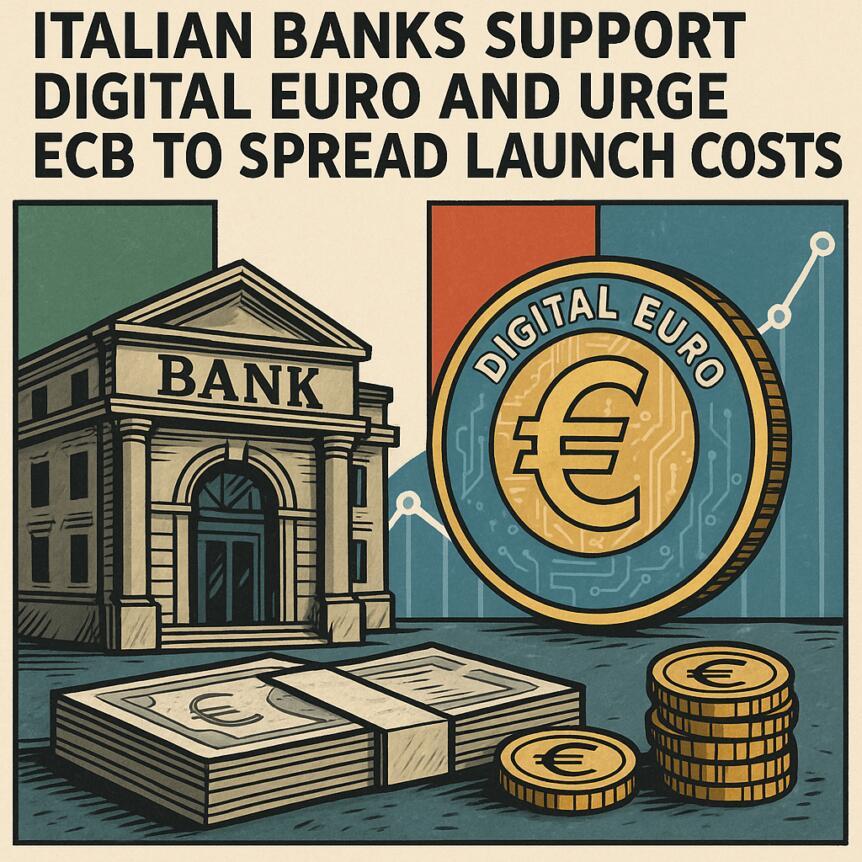
Italian Banks Support Digital Euro And Urge ECB To Spread Launch Costs
- Italian banks endorse the ECB's digital euro project but stress spreading out implementation costs. ECB plans to pilot the digital euro starting in 2027, with a full rollout by 2029, subject to EU legislation approval. Major tech firms have been contracted to support development, including fraud detection and secure transactions. Some European banks remain cautious, concerned about potential deposit drain from retail wallets. European policymakers are exploring scaled-down options to balance innovation with privacy and competition.
Italian banks have expressed support for the European Central Bank's (ECB) digital euro initiative but are advocating for a phased implementation to ease financial burdens.“We're in favor of the digital euro because it embodies a concept of digital sovereignty,” said Marco Elio Rottigni, General Manager of the Italian Banking Association (ABI), during a recent press seminar in Florence.“However, the costs associated with the project are substantial, considering the capital expenditure banks must sustain. These expenses could be better managed if spread over time.”
The comments come at a critical juncture as some French and German banks have voiced reservations regarding the CBDC. Their concern revolves around the potential for ECB-backed retail wallets to siphon deposits from traditional commercial lenders, posing a challenge to the stability of existing banking networks.
137 countries and currency unions, representing 98% of global GDP, are exploring a CBDC. Source: CBDC TrackerFollowing an October 29–30 meeting in Florence, the ECB's Governing Council approved advancing the digital euro project to its next phase. The initial pilot phase is scheduled for 2027, with a full deployment anticipated in 2029, contingent upon the adoption of EU legislation in 2026. European Parliament member Fernando Navarrete, who is leading the legislative review, has proposed a scaled-down version of the digital euro to better protect existing private payment systems, including initiatives like Wero - a collaboration among 14 European banks.
Rottigni advocates for a“twin approach,” advocating for both the ECB's digital euro and digital currencies backed by commercial banks.“Europe shouldn't fall behind in digital innovation,” he emphasized, highlighting the importance of a balanced ecosystem that promotes competition and preserves privacy standards.
Last month, the ECB announced strategic partnerships with seven technology firms to support the development of the digital euro, covering areas such as fraud prevention, secure data exchange, and innovative software solutions. Among these are fraud-detection specialist Feedzai and security company Giesecke+Devrient (G+D). The collaborations aim to introduce features like“alias lookup,” which enables users to conduct transactions anonymously and offline, further enhancing the security and privacy facets of the digital euro initiative.
Crypto Investing Risk WarningCrypto assets are highly volatile. Your capital is at risk. Don't invest unless you're prepared to lose all the money you invest.
Legal Disclaimer:
MENAFN provides the
information “as is” without warranty of any kind. We do not accept
any responsibility or liability for the accuracy, content, images,
videos, licenses, completeness, legality, or reliability of the information
contained in this article. If you have any complaints or copyright
issues related to this article, kindly contact the provider above.

















Comments
No comment